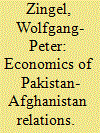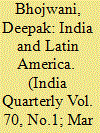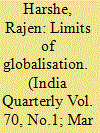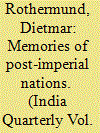|
|
|
Sort Order |
|
|
|
Items / Page
|
|
|
|
|
|
|
| Srl | Item |
| 1 |
ID:
127839


|
|
|
|
|
| Publication |
2014.
|
| Summary/Abstract |
Pakistan and Afghanistan are partners in the War against Terrorism that has tremendous repercussions on their economies. Bilateral relations have been difficult, as Afghanistan blames Pakistan of interfering in their internal affairs, while the war in Afghanistan has spilled over to Pakistan. Plans to tap the natural resources in both the countries, to link the gas and oil fields of Central Asia to the Sea and to exploit the opportunities of the emerging markets in Central Asia cannot materialise as long as the disturbances in Afghanistan and western Pakistan go on. Economic factors are intertwined with non-economic ones, mutually determining each other. As the USA and their allies have started to pull out their troops from Afghanistan, the neighbours have to find a new modus vivendi. In August 2013 their leaders begun to sort out problems of the transit trade that is vital for Afghanistan and that Pakistan has to make sure not to lose.
|
|
|
|
|
|
|
|
|
|
|
|
|
|
|
|
| 2 |
ID:
127841


|
|
|
|
|
| Publication |
2014.
|
| Summary/Abstract |
India's relations with Latin America and the Caribbean are more recent than with any other region of the world, for geographical and historic reasons. This piece seeks to trace the early associations, leading up to the consolidation of political and diplomatic relations in the twentieth century, and the more recent phenomenon of exponential increase in commercial and economic relations in this century. The Indian official establishment has recognised the potential that region holds for business and energy security, but also realises that the relationship carries no political baggage. Recent developments on the political and economic front augur well for a strong partnership. Latin America also recognises India as an important global power and a market for its resources, as well as a partner in several business ventures. This essay traces the diplomatic and political relationship, as well as the commercial links that have been established across the region. It examines and outlines the complementarity, given the extensive Latin American resource base, Indian technology, entrepreneurial initiatives, etc., to portray a vision of an even more dynamic future relationship. This will encompass and encourage cultural links with spinoffs in tourism, film production, etc. Eventually, the growing political and economic relationship will lead to establishment of greater physical connectivity, abolishing the myth of distance.
|
|
|
|
|
|
|
|
|
|
|
|
|
|
|
|
| 3 |
ID:
127843


|
|
|
|
|
| Publication |
2014.
|
| Summary/Abstract |
Globalisation as a phenomenon has subsumed several multi-layered and complex social processes that have been simultaneously at work, especially, after the end of the Cold War in 1991. While analysing the bilateral as well as multilateral interactions among the contemporary nation states, in the context of globalisation, this article sheds light on the existential stresses and strains that contemporary nation states, developed as well as developing, have been constrained to encounter owing to the rise of transnational actors as well as sub-national/secessionist forces. In the process, it revisits concepts such as capitalism, the nation state, hegemony, in Gramscian sense and imperialism while recasting them under changing circumstances of world politics. It argues that, despite diverse existential challenges, the nation state has proved remarkably resilient. It continues to survive as the primary de jure anchor/actor that provides major communication channels to work out projects of cooperation/coalitions, including alliances and treaties. Hence, it is the most reliable entity towards management and even resolution of issues of global concerns as also intra- and inter-state conflicts in contemporary world politics.
|
|
|
|
|
|
|
|
|
|
|
|
|
|
|
|
| 4 |
ID:
127844


|
|
|
|
|
| Publication |
2014.
|
| Summary/Abstract |
Seven nations lost their colonial empires after the World War II. Italy and Japan had to relinquish their colonies immediately after the war. Great Britain granted independence to India in 1947 and released most of its African colonies in 1960. France and the Netherlands reclaimed their colonies after recovering their sovereignty after the war, but they had to abandon them nevertheless after intense struggles. Belgium shared the same fate. Only Portugal clung to its 'overseas provinces' until 1974 when democratisation and decolonisation coincided. Scholars representing these seven nations met at Heidelberg University in May 2013 to compare notes concerning the post-imperial memories of their nations. The conference was supported by the Robert Bosch Foundation, Stuttgart. The period after decolonisation was characterised by long silences in the post-imperial nations. It is only in recent times that intensive debates of the imperial past and its conflicting memories have been conjured up.
|
|
|
|
|
|
|
|
|
|
|
|
|
|
|
|
| 5 |
ID:
127840


|
|
|
|
|
| Publication |
2014.
|
| Summary/Abstract |
Modern piracy has emerged as the bane of the contemporary seafarer. Having first made headlines in 2005, Somalian piracy has evolved considerably within a short period of time and has emerged as a major maritime threat with transnational characteristics in the Indian Ocean region. The Somalian piracy, which had extensive tribal linkages initially, has now developed extensive linkages with terrorist organisations and well-financed organised criminal gangs based inland and modifying its modalities of operation over time. Somalia, regarded as a failed state, has made progress in introducing a sense of democracy and stability by the election of a new President but the efficacy of basic democratic institutions is low and hence governance is still rudimentary. In such an atmosphere, the solution for eradicating piracy does not exclusively lie at sea as is often perceived by most governments. The innumerable warships in the region can at best suppress the number of incidents temporarily, as has been done currently. But complete eradication necessitates the espousal of multi-pronged proactive approaches that need to be collaborated by all the major stakeholders and the affected states-otherwise piracy will undoubtedly see a resurgence shattering the current sense of achievement.
|
|
|
|
|
|
|
|
|
|
|
|
|
|
|
|
|
|
|
|
|